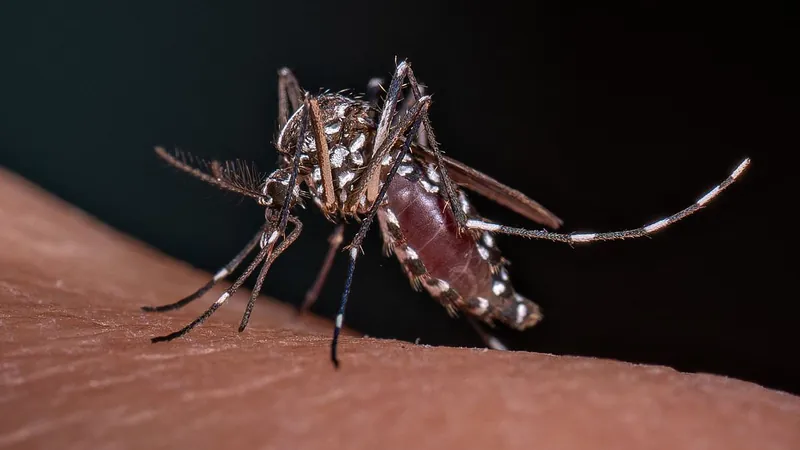
Deadly Mosquito-Borne Diseases on the Rise: Expert Tips to Keep You Safe
2025-09-21
Author: Ying
A Surge in Mosquito-Borne Illnesses
This year has seen an alarming spike in mosquito-borne diseases, with cases reaching record levels. In the U.S., infections of the West Nile Virus have surged by 40%, bringing the total to around 770 cases, many of which involve severe illness impacting the brain.
In Florida, dengue fever is causing a local outbreak for the second consecutive year, raising concerns given its potential for severe internal bleeding.
On a global scale, a chikungunya virus outbreak in China has prompted travel warnings from health authorities, worried about potential spread to the U.S. Additionally, malaria is making a comeback with rising cases in South America, where untreated infections can be fatal.
Expert Insights: What You Need to Know
Experts are increasingly concerned about the geographical spread of these diseases. Dr. Sharon Nachman from Stony Brook Children's Hospital notes that the mosquito population is gradually moving up the East Coast, increasing the risk of transmission.
Dr. Louisa Messenger, a global health expert, highlights that her state is considering heightening mosquito control measures in response to their rapidly growing numbers.
Protect Yourself: Essential Prevention Tips
With the rising threat of mosquito-borne diseases, experts provide crucial tips to minimize your risk. One primary recommendation is the use of mosquito repellents. Dr. Nachman suggests selecting products containing DEET, which effectively deters both mosquitoes and ticks.
For children, it's best to apply the repellent on clothing rather than on bare skin, reducing the chance of accidental ingestion during play. Adults should remember to target exposed skin areas—especially the neck, face, arms, and legs—and reapply every few hours.
Exploring Alternative Repellents
Beyond sprays, burning coils and topical repellents like lotions or wipes can also provide protection. While studies indicate that household ingredients such as garlic or cinnamon may have some repellent properties, they are not EPA-approved and should not replace proven repellents.
Home Strategies: Keep Mosquitoes at Bay
Reducing mosquito populations begins at home. According to Dr. Nachman, empty any containers that collect stagnant water, as even small amounts can serve as breeding sites. Installing door and window screens, and using air conditioning in the evening can also deter mosquitoes from entering.
Innovative Solutions: Zappers and Traps
For outdoor gatherings, mosquito zappers and traps can help manage populations. Zappers attract mosquitoes using UV light and can eliminate them on contact, while traps use human-like pheromones to lure and ensnare these pests before they can bite.
While these devices can reduce mosquito numbers in your immediate area, they may not completely eradicate them, so additional protective measures remain vital.
Stay Vigilant and Informed
As experts continue to monitor the escalating threat of mosquito-borne diseases, it's crucial for everyone to stay informed and take active steps to protect themselves and their families. Awareness and preparation can make all the difference in keeping these pesky, disease-carrying insects at bay.



 Brasil (PT)
Brasil (PT)
 Canada (EN)
Canada (EN)
 Chile (ES)
Chile (ES)
 Česko (CS)
Česko (CS)
 대한민국 (KO)
대한민국 (KO)
 España (ES)
España (ES)
 France (FR)
France (FR)
 Hong Kong (EN)
Hong Kong (EN)
 Italia (IT)
Italia (IT)
 日本 (JA)
日本 (JA)
 Magyarország (HU)
Magyarország (HU)
 Norge (NO)
Norge (NO)
 Polska (PL)
Polska (PL)
 Schweiz (DE)
Schweiz (DE)
 Singapore (EN)
Singapore (EN)
 Sverige (SV)
Sverige (SV)
 Suomi (FI)
Suomi (FI)
 Türkiye (TR)
Türkiye (TR)
 الإمارات العربية المتحدة (AR)
الإمارات العربية المتحدة (AR)